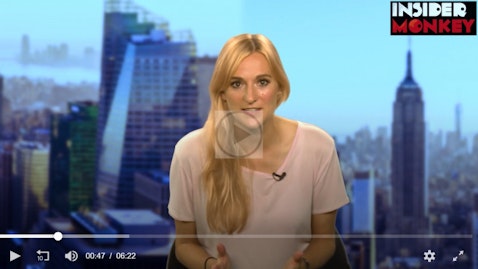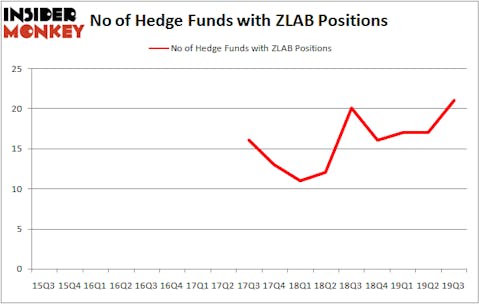Russell 2000 ETF (IWM) lagged the larger S&P 500 ETF (SPY) by more than 10 percentage points since the end of the third quarter of 2018 as investors first worried over the possible ramifications of rising interest rates and the escalation of the trade war with China. The hedge funds and institutional investors we track typically invest more in smaller-cap stocks than an average investor (i.e. only about 60% S&P 500 constituents were among the 500 most popular stocks among hedge funds), and we have seen data that shows those funds paring back their overall exposure. Those funds cutting positions in small-caps is one reason why volatility has increased. In the following paragraphs, we take a closer look at what hedge funds and prominent investors think of Zai Lab Limited (NASDAQ:ZLAB) and see how the stock is affected by the recent hedge fund activity.
Zai Lab Limited (NASDAQ:ZLAB) was in 21 hedge funds’ portfolios at the end of September. ZLAB has experienced an increase in hedge fund sentiment of late. There were 17 hedge funds in our database with ZLAB holdings at the end of the previous quarter. Our calculations also showed that ZLAB isn’t among the 30 most popular stocks among hedge funds (click for Q3 rankings and see the video below for Q2 rankings).

Video: Click the image to watch our video about the top 5 most popular hedge fund stocks.
Hedge funds’ reputation as shrewd investors has been tarnished in the last decade as their hedged returns couldn’t keep up with the unhedged returns of the market indices. Our research has shown that hedge funds’ large-cap stock picks indeed failed to beat the market between 1999 and 2016. However, we were able to identify in advance a select group of hedge fund holdings that outperformed the Russell 2000 ETFs by 40 percentage points since May 2014 (see the details here). We were also able to identify in advance a select group of hedge fund holdings that’ll significantly underperform the market. We have been tracking and sharing the list of these stocks since February 2017 and they lost 27.8% through November 21, 2019. That’s why we believe hedge fund sentiment is an extremely useful indicator that investors should pay attention to.

Kris Jenner of Rock Springs Capital Management
Unlike the largest US hedge funds that are convinced Dow will soar past 40,000 or the world’s most bearish hedge fund that’s more convinced than ever that a crash is coming, our long-short investment strategy doesn’t rely on bull or bear markets to deliver double digit returns. We only rely on the best performing hedge funds‘ buy/sell signals. Let’s take a look at the latest hedge fund action regarding Zai Lab Limited (NASDAQ:ZLAB).
Hedge fund activity in Zai Lab Limited (NASDAQ:ZLAB)
Heading into the fourth quarter of 2019, a total of 21 of the hedge funds tracked by Insider Monkey were bullish on this stock, a change of 24% from the previous quarter. Below, you can check out the change in hedge fund sentiment towards ZLAB over the last 17 quarters. So, let’s review which hedge funds were among the top holders of the stock and which hedge funds were making big moves.

More specifically, Segantii Capital was the largest shareholder of Zai Lab Limited (NASDAQ:ZLAB), with a stake worth $107.7 million reported as of the end of September. Trailing Segantii Capital was Hillhouse Capital Management, which amassed a stake valued at $25.8 million. Indus Capital, Rock Springs Capital Management, and OrbiMed Advisors were also very fond of the stock, becoming one of the largest hedge fund holders of the company. In terms of the portfolio weights assigned to each position Segantii Capital allocated the biggest weight to Zai Lab Limited (NASDAQ:ZLAB), around 14.63% of its 13F portfolio. Indus Capital is also relatively very bullish on the stock, setting aside 3.78 percent of its 13F equity portfolio to ZLAB.
As industrywide interest jumped, specific money managers have jumped into Zai Lab Limited (NASDAQ:ZLAB) headfirst. Hillhouse Capital Management, managed by Lei Zhang, created the biggest position in Zai Lab Limited (NASDAQ:ZLAB). Hillhouse Capital Management had $25.8 million invested in the company at the end of the quarter. Albert Cha and Frank Kung’s Vivo Capital also made a $7.2 million investment in the stock during the quarter. The other funds with new positions in the stock are Ernest Chow and Jonathan Howe’s Sensato Capital Management, Steve Cohen’s Point72 Asset Management, and Ben Levine, Andrew Manuel and Stefan Renold’s LMR Partners.
Let’s now take a look at hedge fund activity in other stocks – not necessarily in the same industry as Zai Lab Limited (NASDAQ:ZLAB) but similarly valued. These stocks are Amkor Technology, Inc. (NASDAQ:AMKR), Biohaven Pharmaceutical Holding Company Ltd. (NYSE:BHVN), PQ Group Holdings Inc. (NYSE:PQG), and PriceSmart, Inc. (NASDAQ:PSMT). This group of stocks’ market valuations match ZLAB’s market valuation.
| Ticker | No of HFs with positions | Total Value of HF Positions (x1000) | Change in HF Position |
|---|---|---|---|
| AMKR | 25 | 116243 | 6 |
| BHVN | 34 | 455638 | -4 |
| PQG | 7 | 55742 | 1 |
| PSMT | 9 | 50814 | -6 |
| Average | 18.75 | 169609 | -0.75 |
View table here if you experience formatting issues.
As you can see these stocks had an average of 18.75 hedge funds with bullish positions and the average amount invested in these stocks was $170 million. That figure was $264 million in ZLAB’s case. Biohaven Pharmaceutical Holding Company Ltd. (NYSE:BHVN) is the most popular stock in this table. On the other hand PQ Group Holdings Inc. (NYSE:PQG) is the least popular one with only 7 bullish hedge fund positions. Zai Lab Limited (NASDAQ:ZLAB) is not the most popular stock in this group but hedge fund interest is still above average. Our calculations showed that top 20 most popular stocks among hedge funds returned 37.4% in 2019 through the end of November and outperformed the S&P 500 ETF (SPY) by 9.9 percentage points. Hedge funds were also right about betting on ZLAB as the stock returned 23% during the fourth quarter (through the end of November) and outperformed the market. Hedge funds were rewarded for their relative bullishness.
Disclosure: None. This article was originally published at Insider Monkey.


